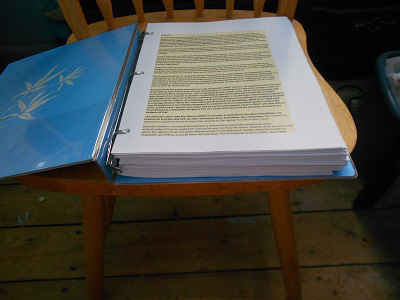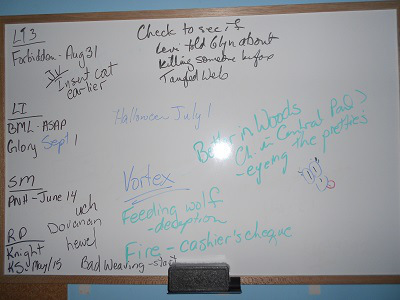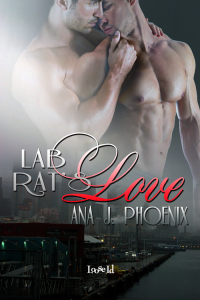Kate Lowell's Blog, page 32
July 7, 2014
Three Dirty Birds Talk About Story Trumps Structure: Chapter 7
The Three Dirty Birds are back again, pecking away at Stroy Trumps Structure, by Steven James. This episode is the first one to touch on the pantser vs. the outliner.
Zoe: I think we should take a moment to make a distinction up front that I’m not sure James himself clearly makes (because if he had, I might not have been so cranky through this chapter). When he says “plotter” or “outliner,” what he means (I eventually sussed out) is, specifically, someone who uses a rigid template—like Joseph Campbells’s The Hero’s Journey—and asks no questions about the story outside of the parameters of that template, and then writes their book according to that “outline.” That’s one way to plot, one way to outline, but it doesn’t necessarily describe all plotters or outliners. In fact, while reading this chapter, I kept going, “What you’re describing is how I plot.” (And then in chapter seven he actually devotes a paragraph to why you can’t simply plot this way, which explains why the spine on my copy has a little wall-shaped dent in it.)
I found myself wishing that James had not chosen to frame his book as an anti-plotting book, or as an “organic writers” versus plotters book, because it contains valuable information of use to both plotters and “organic writers” (despite James’s thoughts otherwise), but the blatant disdain for plotting (and plotters) can be hard to get past for someone who has nothing against plotting. (As can the occasional blatant self-congratulatory bits. I have a Post-It Note on page 87 that says, “You brave pioneer you.”) If I had not been reading this book for our discussions, this is the chapter where I would have walked away from it—despite the useful information it contains. So in this week’s discussion, you can refer to me as Ms. Crankybird.
Kate: So I guess that means that Zoe is a pantser after all. I found he described my process to a T, and I, in no way, am a plotter. It’s like writing from inside a straitjacket for me. The likelihood of me finishing a story if I write out the whole thing before I start is almost nil, because in my head, I’ve already written it.
Ana: I had a bit of a problem with him saying that plotters always end up with these artificial stories because once they’ve made an outline they stick to it and don’t dare to deviate or explore other possibilities anymore. That’s simply not true for any of the plotters I know. I’m not a plotter myself.. well, not all the time, but most people who do plot tell me they end up having to make changes to their outlines and such.
Zoe: I got the impression that he imagined plotters sat down for an afternoon, banged the outline out, and done. It takes me weeks, sometimes months, sometimes years to plan a story out.
Ana: What, only a year? Where do you find the time to get to know your characters?
Zoe: What characters?
Kate: Lol. He did seem to have a very one-sided view of plotters.
Ana: It’s kind of funny because I’m used to getting this sort of one-sided view on pantsing from plotters.
Kate: It is funny, because I don’t think a pantser is any more or less likely to have to cut words or scenes out of a story than a plotter is. If anything, plotters run a greater risk of having to shred things simply to get past suspension of disbelief, because as their characters grew, the plot became less plausible.
Zoe: In the film Glengarry Glen Ross, Alec Baldwin tells the sales team to Always Be Closing. I think the best writers follow Always Be Plotting—you’re doing it through the whole process, always evaluating and reevaluating and adjusting.
Kate: If you give a hoot, you should always be doing that. If your current plotline requires a bit of Author Ex Machina to make it even semi-believable, then you’re doing something wrong and you need to go back and put in the work to fix it.
Ana: True. It felt to me in this chapter, and some other parts of the book, that James was fed up with people saying that writers needed to be plotters, and then he went the other extreme. To be honest, I always get annoyed when someone tries to tell me about the ONE TRUE WAY of writing. ‘Cause we’re all the same, you know.
Zoe: Five pages into the chapter, we finally get past the (first) wave of plotters vs. outliners and get to the good stuff. Here he says that your characters need to act in contextually believable ways, all the time. Everything that happens in the story will be caused by the thing that precedes it—causality, which I think leads to his next point: inevitability: the end of every scene must not only be logical but, in retrospect, the only possible conclusion to that scene. (But, at the same time, the scene has to end in an unexpected way: if readers figure out what’s going to happen before it happens, they get bored, so scenes must be inevitable mostly in retrospect). If your characters solve something without a setback, he says, you don’t have a story. Tension must continue to escalate, scene by scene, until it reaches a climax, after which nothing is the same again.
Ana: I was wondering if I can end every scene in an unexpected way. Sometimes it feels like the only way to do something completely unexpected would be to throw in tentacles. (Then again, everyone who’s read our talk would expect them.)
Zoe: Let it be noted that Ana brought up the tentacles this time. But yes, I was thinking that too, that it could almost seem gimmicky if you try too hard to put a surprise in each scene.
Kate: I think if you try too hard to have a surprise at the end of each scene, it reduces the impact of the important surprises.
Ana: Reminds me of a certain writer with a love for cliffhangers. Like, every chapter.
Zoe: I think in some cases you can think of it more as asking yourself, “How will the reader want this scene to end,” and seeing if you can dodge that, at least a little.
Kate: Your own twist on the expected result, determined by the characters, not by your need to be amazing and different.
Zoe: Right, and leave the reader not completely satisfied, so they want to read on to get the resolution they’re looking for.
Kate: I generally try to lay a hook, or the beginning of the next nervous tension thread, just before I resolve something for the reader at the end of a scene.
Ana: Sounds like a good way to handle it. I also (again) wasn’t completely happy with his take on the romance genre.
Kate: Hahaha! My sticky note! How would the MC handle his woman being disrespected? Aaaargh! Maybe she just o-goshi’s the dude herself.
Zoe: So we agree again that romance is not his genre. (But he thinks he knows enough about it to stick in poorly thought out suggestions.)
Ana: Of course. Romance isn’t so complicated a genre that you’d have to actually study, or, you know, read it.
Kate: *twirls hair around finger and giggles*
Zoe: Section 6—”Reevaluate where you’re going”—kind of exhausted me. He prints out ten or fifty or a hundred pages and rereads them before he starts writing them, he’s prepared to go back and rework earlier sections of the manuscript, and when he’s done for the day, he prints out what he worked on, reads it (again) in context, marks up changes, and enters them in. I can’t work like that. I get a draft done, then I edit.
Ana: I shudder at the thought of reading my writing that often, to be honest. I’m more like you. I might make small edits or notes while writing draft, but I basically try to get to the finish line before starting the massive rewrites. Because I get a better sense of my story, my characters and my ending then.
Kate: Now, this is where I’m different from you guys. I’m back and forth in my manuscript all the time. I have my signposts that I’m aiming for, and those will often be the scenes that are written first. Then I write forward and back from them, jumping around in the manuscript until everything meets up. So, to be honest, while he seems to do a lot more re-reading than I do while in first draft, his process isn’t terribly different from mine. There will be massive editing once I’m done, but a lot of it gets fixed as I figure out what scenes are happening where and making changes as I go.
Zoe: I’m back and forth in my “outline” a lot, but only a little bit in the manuscript (usually to double-check something or make a quick change.) (My “outline” looks nothing like an outline though. It’s more a synopsis.)
Ana: I’m not convinced that I’ve found the best way for me to handle things yet. There’s still a lot of flailing and running in circles, but somehow, after a while I end up with a finished product. Somehow.
Zoe: I’ve only found the best way for me to do things this month. Check back next month for a whole new system. :)
Kate: I think that’s, in part, a function of being fairly new writers. But also, the demands of each story are different. You start them with different amounts of understanding, different influences, each time. Of course it’s going to affect your workflow.
Ana: I also find it kind of funny that he tells us he doesn’t know how his story is going to end until he gets there, while I think in another part of the book he tells us how important it is to know your ending so you can write an effective beginning.
Zoe: Yes, and he does it again in chapter 8. I HAVE STICKY NOTES.
Ana: I can only guess that the evening before he writes his ending (when he’s got it in his head) he rewrites the rest of the manuscript to make it fit.
Zoe: Probably. He spends seven pages in the chapter showing us his writing process by talking about an actual scene he wrote, scrapped, and reworked around. (And my sticky note says, “I do this too! Back in the planning phase, when I’m only scrapping sentences and short paragraphs instead of an afternoon’s worth of writing.”)
Kate: Honestly, I don’t know that I actually learned anything in this chapter, since it’s so close to my own style of writing (although he doesn’t mention the flailing and running in circles and sending letters to my editor that essentially say, “This sucks! I suck! I’m going to go jump off a cliff!”). It was nice as an affirmation that I’m not the only weirdo in the world. But I really would have liked even a tiny magic pill that would let me write something with less of the flailing and running in circles, instead of what essentially comes down to “This is how it is.”
Zoe: I learned that if I write a writing book, it will probably be Plotting: More Fun Than You Think! (I think I could actually save a lot of time writing it, too, if I just take all the anti-plotter screed out of this book and repackage it. Because it’s got a lot of great advice for developing your plot and characters.)
Ana: I feel slightly better now for not really knowing my ending, lol. I also felt a little guilty because I’m currently writing the second draft of a story and find myself trying to think of ways to make certain things happen more or less the same way they happened in the first draft so I have to do fewer rewrites. Guess I should stop doing that.
Kate: I don’t know. If you’re paying attention when you put together the first draft, things should flow naturally. You shouldn’t have to change much, it’s just a matter of tweaking to be sure tension is rising and that the choices your characters are making are adequately supported by their established personalities and the events up to that point in the story. It might be why I’m so slow a writer.
Ana: That’s mostly editing for me. I write a new draft, or often end up doing that, because I change the premise of the story and/or add new characters / change the MC’s motivation… things like that. My first drafts are generally written pretty quickly and the second draft takes a bit longer.
Kate: I’m ridiculously slow, but I very rarely ever have to change major things like that. My usual issue is having to go back and add in lines that make things seem like logical progression.
Zoe: I’m fairly fast, but then I have a virtual note card for every chapter, so I know what I’m writing when I sit down to write it, and I know how it’s going to fit in. My second drafts only take as long as they do because I retype them from scratch.
Ana: I’ve tried plotting out stories start to finish so I wouldn’t have to do the major rewrites. So, I had outlines I liked, that I thought were GOOD. Then I near the end of the first draft and think of something BETTER. (Something that obviously requires major rewrites.) I don’t know why this always happens. It’s nice to get these flashes of inspiration, but also a bit frustrating to be honest. There’s just nothing I can do about it.
Zoe: Always Be Plotting. :) I’ve made major changes to drafts after I’ve finished them too.
Kate: Hahaha! that’s my life for the next month, as I go into Bite Me to fill in all the stuff that makes the ending work. ‘Cause right now, I’m getting the editorial beating with a wet noodle.
Ana: Poor Kitty.
Kate: It will make it better in the end. So I don’t mind. Mostly. But there shall be wine. Or Sambuca.
Zoe: Or Frangelico milkshakes. (Which, by the way, are tasty but a little too smooth, so when I made them a second (and third) time, I added rum as well.)
Filed under: Three Dirty Birds Talk, writing Tagged: writing advice








July 5, 2014
Meet Devon and Hunter
Hunter’s on the right.
Part of Vince’s unintentional introduction to the wild weirdness of the hidden society of wereanimals. :P
Filed under: Nutty Romances, Random Weirdness Tagged: red pandas, research, wereanimals








July 4, 2014
Three Dirty Birds Talk Story Trumps Structure: Transforming Characters Through Conflict
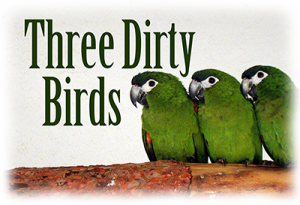
Found today at Ana J. Phoenix’s blog! Tell me, is your protagonist a pebble, or a chunk of putty?
Filed under: Three Dirty Birds Talk, writing Tagged: writing advice








House of Manlove Fourth of July Flash Fiction
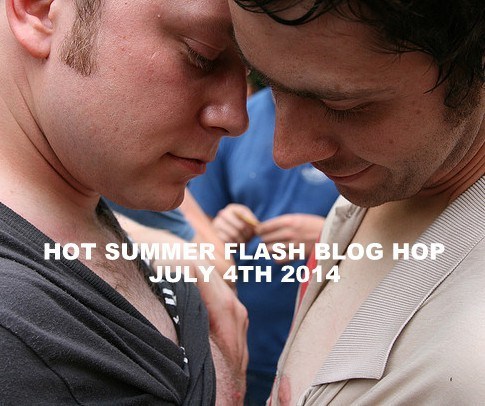 Pop over to Inlinks to catch all the links to all the stories! I went literal with the concept of Summer Madness, by the way, instead of writing a summer fling. But when witches are involved, it’s all madness. :)
Pop over to Inlinks to catch all the links to all the stories! I went literal with the concept of Summer Madness, by the way, instead of writing a summer fling. But when witches are involved, it’s all madness. :)
Bongos
Glyn turned from wiping up the countertop and nearly jumped out of his skin. “Gram!” After silence for half a year, he’d been sure he’d been cast off. But here she was, and it lifted a weight from his heart he hadn’t entirely acknowledged.
“Hello, Glynnie.” She stood in the doorway of his and Levi’s new kitchen, like a beam of sunshine transplanted indoors. “You moved.”
He smiled and hung the cloth over the handle on the oven door. ‘“I did.” Edges lined up just so, the middle row of checks exactly in the center of the handle. The more structured his environment, the less his craziness tried to break free of the bonds he placed on it. As the pattern of the cloth aligned, Glyn’s witchblood settled back into his new normal—slightly agitated and precariously balanced between sanity and witchiness.
“It seems rather…plain. Do you need money?”
“I’m fine, Gram. We only finished building a couple of weeks ago. I’m still decorating.”
“You may call on the coven at need. For anything.”
The tone of her voice raised his hackles. “I’m telling the truth.” He spun to face her, only to be brought up short by the look on her face.
She lifted his chin with one hand, examining his face, his expression. A faint tingle raced over his skin as she read his energy. “You didn’t do it.”
“I would have. I was going to.” Glyn looked away. He’d been willing to trade his free will for Levi.
She frowned, her eyes darkening from spring leaf to summer moss. “What changed your mind?”
“I didn’t.” An unaccustomed flush rose in his cheeks.
“Then what happened?”
“Levi poured it out.” Glyn had been willing, but Levi hadn’t.
Her eyes widened. “He did? So he does love you.”
“Of course he does. He wouldn’t put up with my shit if he didn’t.” She still hadn’t explained why she’d come in person.“Gram, you could have seen this just looking back. Why did you come here to ask me?”
“Oh, Glynnie. I love you. Of all my grandchildren, you’re my favorite.” She glanced away, and a rare glimmer of discomfort flickered across her face. “I should have come earlier, but I didn’t want to see you like that. No witch should live in such a fashion, bound in faerie chaine.” Her gaze met his again. “Even to someone who loves them.”
“He wouldn’t have hurt me.”
She stroked his cheek again. “You were always such a trusting child.”
Glyn rolled his eyes, an old habit he thought he’d given up years ago. “Gram.”
Her eyes danced, and she smiled at him with a witch’s smile, wild as the north wind and careless as the south. “Well, that doesn’t matter anymore. I think we should celebrate.”
Shit. “No, it’s okay—” But it was already too late. Her blood called to him, and his gleefully slipped its bonds, rising to join its voice to hers.
* * * *
Levi closed the truck door and reached in the back to grab the picnic basket he’d picked up for cheap on the way home. He’d started swinging by yard sales whenever he saw one—it helped with the limited decorating budget. Glyn never said a word, but the man had lived in a Central Park condo. Levi knew in his bones what a come-down their current situation was. New house or not.
As he got closer to the front door, he heard the rapid beat of a drum. Not rock music, which wasn’t Glyn’s style anyway, but something more exotic. Maybe African? Had the stubborn witch finally given in and spent money on something that wasn’t absolutely essential? The thought brought a smile to Levi’s lips as he walked through the door.
His excited greeting died half-formed at the kitchen door. The first thing he saw was Glyn, stark naked and laughing hard enough tears streamed down his cheeks. The walls were covered in something that looked like hieroglyphics, the same color as the paint splashed so decoratively over Glyn’s body.
The next thing he noticed was a willowy blonde, sitting on the floor with her back against the refrigerator, a set of bongos cradled within the nest of her crossed legs. She reminded him of Glyn, something in the graceful lines of her body and the way she moved as she tapped the surface of the drums.
A chair danced by, smacking his ankle sharply as it pirouetted in front of him, before galloping across the room to dart underneath the table. A table which stomped ponderously around the edges of the room like a near-sighted elephant with gout.
“Levi!” Glyn whooped in delight and spun over to him. His eyes practically glowed, and an eerie not-quite-human aura surrounded him. “My grandmother is here! Come dance.” He laughed madly and led Levi into the center of the room, singing off-key in some language that wasn’t English or Spanish.
“What’s going on?”
“We’re celebrating!” He hooked his arms around Levi’s neck and practically swung off him. “Somebody’s overdressed.” He let go of Levi and attacked the buttons of his workshirt.
Levi fended him off and looked at the woman. “And you are?”
“I just told you—that’s Gram.” Glyn struggled against Levi’s grip. “Oh, are we playing?” He laughed, and now that he was listening for it, Levi could hear something else in his voice. Magic, maybe? He’d heard Glyn go witchy before in a bad way, but he’d never heard him happy and drunk on power. His lover was normally locked down so tight.
Levi thought he could grow to like this side of Glyn.
“So this is the man my grandson loves.” The blonde—how could she be Glyn’s grandmother?—threw her arms around the two of them and made all three sway in time to the bongos, which played themselves on the floor at their feet.
She smelled like Glyn, a wildness like the call of the forest at full moon. He wasn’t particularly interested in women, but even so, his body reacted to her.
“He looks good in clothes, Glyn. What does he look like out of them?” she said.
Levi jumped back as she started tugging at the waistband of his jeans. “Glyn!” he protested.
Glyn laughed and kissed him. “Gram, mine!” Glyn pushed her hands away, only to replace them with his own.
She reached again for Levi’s clothing, giggling as she did. Glyn shoved Levi behind him and grappled playfully with her. Her laugh was joyful and happy and felt like a warm summer night with pack all around. It was like Glyn, a hundred times over.
But he’d be damned if he was going to let her undress him.
Glyn appeared to have the same idea. He shoved gently at the blonde and chivvied her toward the door. “Goodbye, Gram. You’ve seen him. Now it’s time to leave.”
“Such a greedy child.”
“Blood tells. Bye, Gram.”
Her laugh floated down the hall, the door slammed, and they were alone.
Glyn came back into the kitchen. “Celebrate,” he said and jumped on Levi.
Levi kissed him. “Celebrate. And tomorrow we can clean the paint off the walls.”
Filed under: Bite Me Later, Random Weirdness Tagged: flash fiction, mm romance, werewolves, witches








July 3, 2014
What 95K Looks Like
I printed this off the other day.
It’s the full manuscript of Knight, plus the two page revision letter. I’m rereading a bunch of my research and my notes, and plan to start hacking and slashing my way through the manuscript over the weekend. I’m thinking about stopping at the business supply place to pick up another whiteboard. When I’m working on something, I do things like this:
As soon as I think of something I need to fix, or check, or a solution to a problem I’m not yet dealing with but is coming down the pipe, it goes on the whiteboard. This is the board for the story I just finished. I have to erase it now and start up lists and ideas for the squirrel sequel. The other board will be for Glory, which I need to work on again today. So I need another one to keep track of dates and ideas for stories, something that isn’t on the computer where I’ll forget it. My reminders have to be visual, and they have to be there.
I wish I could be a bit more like Zoe, with all these planners and her new Write Moar project. But my type of creativity doesn’t respond well to that, though I might give some of her doodads a try on my next project.
Filed under: writing Tagged: productivity, workflow








July 2, 2014
Three Dirty Birds Talk: Story Trumps Structure–Climaxes
We’re over at Zoe’s blog today!
How did we end up talking about tentacles?
Filed under: Three Dirty Birds Talk, writing Tagged: tentacles, writing advice








July 1, 2014
Tuesday Guest Tickle: Lab Rat Love by Ana J. Phoenix
Out today from Loose Id!
Blurb:
When Nex blows all his money on drugs and gambling, Kane offers to pay off his debts. But his generosity comes at a price: Nex has to become his lab rat. Kane’s company has developed a sex chip, and Nex is the only eligible test candidate.
Nex doesn’t mind having kinky sex with a drop-dead gorgeous CEO for testing purposes. Even less so when Kane turns out to be all Nex ever wanted in a Dom and in a boyfriend. There’s only one problem. Kane used to live with Nex’s deceased twin, someone who Kane may be hung up on, even if he denies it.
Still, Nex wants Kane, and he knows there’s only one way to get him: kick the drugs and stay clean — before his addiction ruins the experiment and their budding relationship.
Excerpt:
They found themselves in a large bedroom. Bookshelves lined one side of it, just like the ones in the office. A desk, a wardrobe, and a king-size bed, all made out of light wood, took up most of the rest of the space. A fluffy orange carpet decorated the floor at their feet.
“This your bedroom?” Nex asked, frowning. Was that “something” Kane wanted to show him going to be his dick?
“Correct.”
Kane approached him from behind. He was so close now that if Nex had taken one step back, he would have bumped right into the arrogant bastard. It made the hairs on Nex’s neck stand up, just thinking about Kane’s hard male body. Thinking about Kane who seemed to have quite a thing for sex toys and quite a thing for Nex.
“Look around a little more; anything else you notice?”
Nex’s gaze found a hook in the wall above the bed’s headboard. He stood completely still for a moment, the implications of his discovery going through his mind.
“What do you think goes through there?” Kane asked, coming a step closer, that small step that made him press into Nex. Nex took a deep breath to help him calm down, but instead he got a lungful of Kane’s scent, leather and spice, and that didn’t help at all.
“Chains,” Nex said.
“You seem to like the idea.” Kane raised his hand, stroking through a lock of Nex’s hair, sending a shiver down Nex’s spine and into his groin area.
Was there any point in denying it? As much as Nex hated Kane’s arrogance, his dick didn’t seem to mind. “You’ll find I’m not as submissive as some like,” Nex said.
“You’ll let me find out?” Kane tugged at Nex’s hair, tilting his head back to make Nex look up at him.
How cool an idea is this? Great psychological drama.
Filed under: Uncategorized








June 30, 2014
Absolutely Erotic Blog Hop: Karenna Colcroft
Karenna is a prolific author, with a career stretching all the way back to 2006. She writes in a number of genres, but she’s best know for her Real Werewolves Don’t Eat Meat series.
 The series is now complete, which is always nice if you’re just discovering it, and I’ve linked to its page up above. The six related novels, starting with Salad on the Side, follow the adventures of an alpha werewolf, his vegan werewolf lover, and his pack.
The series is now complete, which is always nice if you’re just discovering it, and I’ve linked to its page up above. The six related novels, starting with Salad on the Side, follow the adventures of an alpha werewolf, his vegan werewolf lover, and his pack.
 She also writes contemporary MM, including The Pink, It Burns (have I mentioned how much I love her titles?). In this one, a quick stop at a coffee shop foils a child abduction and leads to afternoon romance.
She also writes contemporary MM, including The Pink, It Burns (have I mentioned how much I love her titles?). In this one, a quick stop at a coffee shop foils a child abduction and leads to afternoon romance.
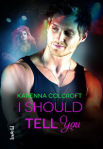 Her penchant for introducing broken characters and redeeming them is well in evidence in her book I Should Tell You, in which a drag queen and a musician help heal each other’s old wounds.
Her penchant for introducing broken characters and redeeming them is well in evidence in her book I Should Tell You, in which a drag queen and a musician help heal each other’s old wounds.
 Another werewolf romance, Hooch and Howls introduces a reclusive werewolf and a couple of runrunners. What’s better than hot shapeshifters and booze? Coming from a runrunning area myself, I say nothing!
Another werewolf romance, Hooch and Howls introduces a reclusive werewolf and a couple of runrunners. What’s better than hot shapeshifters and booze? Coming from a runrunning area myself, I say nothing!
I also managed to tie her down for a few minutes and pry an interview out of her, and some info on her upcoming novel, Love Like Vampires, coming soon from Dreamspinner Press.
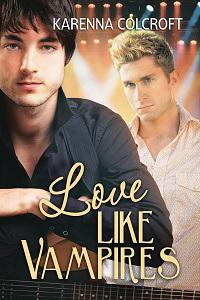 All Thaniel Robichaud has ever wanted is for his band to hit the big-time. All Shane McCarthy has ever wanted is Thaniel.
All Thaniel Robichaud has ever wanted is for his band to hit the big-time. All Shane McCarthy has ever wanted is Thaniel.
Friends since childhood, Thaniel and Shane started making music together while still in junior high school. In the ten years since, they’ve taken their band, Love Like Vampires, from struggling over chords in Thaniel’s basement to headlining at clubs, and recently they opened for one of rock’s biggest names. Along the way, Shane stunned Thaniel with a proclamation of love, and when Thaniel returned his feelings, their relationship gave them the strength to weather the rough patches. But with the band about to break apart, it may not be enough to hold everything together. Their dream is slipping through their fingers just as they’re perched on the cusp of success.
Which of your main characters is your favorite and why?
You know this is like asking a mom to choose which baby she likes best, right? If I have to pick one, I would say Kyle Slidell from my Real Werewolves Don’t Eat Meat series. He’s a complete wiseass, and was a lot of fun to write.
Why do you like writing this pairing as opposed to other pairings?
I don’t only write one pairing. I write male/male; male/female; and menages with a variety of combinations. I believe love is love and sex is sex, and as long as everyone’s a consenting adult it’s all good.
As a writer, do you prefer the aspects of paranormal, and its freedom to create, or do you prefer keeping it within bounds of the every day lives of contemporary characters?
I’ve written both, and I would have to say I prefer contemporary at this point. Paranormal is fun, and I get to play god a little bit, but there’s a lot more world-building involved.
Is there anything that makes you nervous about readers?
Wondering whether they’ll actually read and like my books. Every single time, I wonder about that.
What is the sexiest feature, to you, on a person?
Assuming you mean physical feature, I would say eyes; but honestly, I find intelligence and a sense of humor sexier than anything physical.
How do you feel about fetishes?
To each their own; as I said above, as long as it’s between/among consenting adults, it’s all good. I don’t necessarily understand the mindset behind fetishes, so I wouldn’t be likely to write about them.
Bio:
Karenna Colcroft is the alter ego of a shy, sedate wife and mother who began writing erotic romance on a challenge from a friend. She believes that love is love, regardless of gender or number. As a survivor herself, Karenna often writes about trauma survivors learning to heal from their pasts and find love in spite of what has happened. She lives in the northeastern United States with her husband, two daughters, and three cats.
I’m going to stop there, long before I’ve gotten to the rest of her extensive backlist, because I could just go on forever. Go visit her website and have a look around, or like her Facebook page, https://www.facebook.com/karennacolcroftauthor. She’s also written for a number of anthologies, and not only does she write MM, she also writes MF, so there’s something there for everyone.
Filed under: Random Weirdness, writing Tagged: Abssolutely Erotic Blog Hop








Three Dirty Birds Talk About Story Trumps Structure: Escalation

Here we are again–Three Dirty Birds, Talking about Story Trumps Structure. Today, we’re reading Chapter 4: Escalation.
Kate: By escalation, he’s talking about intensifying situations as the book progresses, making things worse for the protagonist as we get closer to the climax (*giggle*) of the story.
Ana: I thought that was a really good point. It’s not just that things have to go wrong, they also have to get worse, and they need to be connected.
Zoe: Yes—more “out of the frying pan into the fire” than “out of the frying pan, and I also got fired.”
Kate: I was a bit surprised that he thought that progress was counter-intuitive, though. I mean, if you’ve done any amount of reading at all, it seems obvious that everything has to get worse at each stage before you can resolve the story. Like the character has to bottom out before they can rise again. (Zoe is laughing because I used the word bottom)
Ana: I actually did some brainstorming this week with one of my friends who’s never read a book on writing, and even she knew that things have to get worse all the time. I guess it’s not that… Yeah, I’m just going to agree with Kate that if you read a lot, you know that.
Zoe: I guess the real warning is that it has to get worse in a related way—not just throwing in more horrible things to have horrible things. It needs, really, to come out of characters’ choices. Things get worse because they decided to do or not do things. Breaking Bad and Weeds are good examples of things get worse because of the characters. Everything that goes wrong, all the deeper shit Nancy and Walter get into, is because of choices they made.
Kate: A simple technique, but one that sometimes gets missed.
Ana: I also liked how he emphasized that action doesn’t equal tension. I’ve read some utterly boring action scenes.
Zoe: What I took away from that is that tension results from what the action (or whatever’s going on) means to the character, what’s at stake.
Ana: I think in his talk of rising action he also mentions that every sex scene means less and less for readers. Kind of bashing the erotica genre again.
Zoe: I don’t know if was so much bashing as just not considering it.
Ana: I wasn’t really serious about my bashing comment.
Kate: There is a point to it–if the sex is integral to the progression of the story, then it shouldn’t detract from it, and each scene should mean something. But I’ve made that mistake myself, where the sex felt right between the characters, given the situation, but came too close on the heels of another sex scene, and I think it reduced the impact and meaning of it.
Ana: I know I’ve been annoyed by ‘too much sex’ in a book before. Especially when two scenes happen closely together it can be difficult to build any sexual tension between them.
Kate: It’s a tough line to walk, especially when you write for a publisher that likes lots of sex in a book. How many scenes do you include, how often can you fade to black, before you get your knuckles rapped? And the other way around, getting your knuckles rapped by the readers.
Zoe: So it comes back to what you’re trying to accomplish in each sex scene—is it moving the story forward, creating tension, deflating tension? Or is it just there for the sake of more sex? In talking about repetition killing tension, James says that grief—not all the murders/deaths—is what readers respond to, and that brings it back to tension being created by what it means for the characters. Sex is the same way.
Kate: It’s all about the feelz, man.
Zoe: Right! And you can have characters get together early on, but hold something back—does your main character want to live out a fantasy but he’s afraid to? Then you’re growing toward that point. Does he just want a one-night stand and not to get involved? You’re growing toward overcoming that, etc.
Ana: Yeah, for me… or rather, for my characters, sex usually happens before the romance, so I’m often using it to build toward that.
Zoe: Because sex is easy. Love is hard.
Ana: Parts of sex are pretty hard. Or, the parts involved should be.
Kate: I would hope so. Though I just put a damper on the sex in one scene. Hard to be sexy with your mom just down the hall.
Ana: You’re pure evil. But we knew that.
Kate: Lol. It’s a common human experience. I’m sure everyone’s been there.
Zoe: James gets into ways even the smallest things can take the wind out of tension, down to verb choice, punctuation, sentence and paragraph length, adverbs and adjectives. You don’t want to get wordy when you’re in a tense moment in the story. You want readers to feel a little breathless.
Kate: Shorter sentences, crisper verbs, fewer descriptives. Or, long running sentences that leave you out of breath by the time you get to the end. Depends on whether you want to imply decisive action, or terrified pelting down an alley.
Ana: Yup, I think it’s also important to keep it simple in tense moments because you don’t want to confuse the reader and pull them out of the story because they’re wondering about your wording.
Zoe: He also talks about pace, and how you don’t want to stop in the middle of your climax to describe things, which reminded me of a book I read a while back—otherwise good book, but in what should have been one of the most tense moments, it all stopped for the characters to have long conversations about themselves, and then a long, leisurely sex scene, and it really bogged that part of the book down. I should have had my heart in my throat, but instead I was skimming and flipping pages.
Ana: He/she probably (falsely) assumed the tension of the approaching climax would carry you through the boring parts.
Zoe: I think what was going on was they were looking for a point where they could give the characters a chance to get to know each other and connect, since they hadn’t had much opportunity for that. It was just…the wrong place. I’m not sure its place was even in this book. But when you’re writing romance, you want to make sure the readers get why these two people are The One for each other, and sometimes you get it wrong.
Kate: Keeping the characters’ desire in the forefront is really important at this point of a book. Well, through all of it, really, but by the time you get close to the climax, dealing with these desires should be just about everything the character is interested in dealing with. It should be big, and overwhelming, and not give anyone time to wander away to check out the TV Guide.
Zoe: Yes, and that’s where this part of that book missed the mark. The character’s desire was to keep the other character safe from a threat to his life. Sex shouldn’t have been on his mind. (Or, well, it should have been on his mind, but he should have been thinking, “There’s no way I’m doing that right now when he could get killed.”) The danger to that other character was literally right outside the door.
Ana: “One last time before we bite it”? I’m wanting to sing ‘Can you feel the love tonight?’
Zoe: Lol.
Kate: I was just wondering if it was his mother.
Zoe: That would have been interesting, but alas.
Ana: Guess it wasn’t Kate’s novel.
Kate: Lol. I have too many of these walk-in things. There must be a part of me that’s never made it past the age of 12.
Ana: Some days I’m happy I even got to the age of 12.
Zoe: Right…so that wraps up this chapter. Next we get to the one we’ve all been waiting for: the climax! (Nudge nudge)
Filed under: Three Dirty Birds Talk, writing Tagged: commentary, writing advice








June 29, 2014
Hey, guess where I am today?
I’m over at the fascinating blog of MC Hana, the author of the fabulous space opera Moro’s Price. Read my interview, then come back and tick the box for a chance to win a print copy of Forgotten Menagerie!
I know, I should get a paid WordPress site. One of these days, but not financially responsible yet.
Filed under: Nutty Romances, Random Weirdness Tagged: author interview, mm romance









